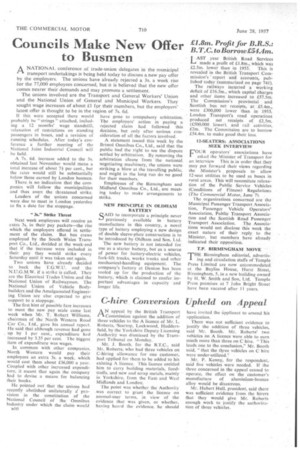Councils Make New Offer to Busmen
Page 44

If you've noticed an error in this article please click here to report it so we can fix it.
ANATIONAL conference of trade-union delegates in the municipal transport undertakings is being held today to discuss a new pay offer by the employers. The unions have already rejected a 3s. a week rise for the 77,000 employees concerned, but it is believed that the new offer comes nearer their demands and may promote a settlement.
The unions involved are the Transport and General Workers' Union and the National Union of General and Municipal Workers. They sought wage increases of about Li for their members, but the employers' latest offer is thought to be in the region of 7s. 6d.
If this were accepted there would probably be " strings " attached, including a 12 months' wage standstill, relaxation of restrictions on standing passengers in buses, and a revision of running schedules. After today's conference a further meeting of the National Joint Industrial Council will be held.
A 7s. 6d. increase added to the 5s. obtained last November would mean a total increase of about 7+ per cent., but the rates would still be substantially below those earned by London busmen.
There is no indication that the companies will follow the municipalities and thus avert the threatened strike.
Leaders of the unions concerned were due to meet in London yesterday to fix a date for the stoppage.
"3s." Strike Threat Next week employees will receive an extra 3s. in their pay packets—the rise which the employers offered in settlement of the claim. But bus crews employed by the South Wales Transport Co., Ltd., decided at the week-end that if the increase were included in their pay they would strike every Saturday until it was taken out again.
Two unions have already decided to back the T.G.W.U. and the N.U.G.M.W. if a strike is called. They are the Electrical Trades Union and the National Union of Railwaymen. The National Union of Vehicle Bodybuilders and the Amalgamated Engineering. Union arc also expected to give support to a stoppage.
The first hint of possible fare increases to meet the new pay scale came last week when Mr. T. Robert Williams, chairman of the North Western Road Car Co., Ltd., gave his annual report. Ile said that although revenue had gone up by I per cent., expenditure had increased by 3.35 per cent. The biggest item of expenditure was wages.
In common with other companies, North Western would pay their employees an extra 3s. a week, which would cost them about £36,000 a year. Coupled with other increased expenditure, it meant that again the company had to devise a means for balancing their books.
He pointed out that the unions had recently abolished unilaterally a' provision in the constitution of the National Council of the Omnibus Industry under which the claim would u10 have gone to compulsory arbitration. The employers' action in paying a rejected claim had followed this decision, but only after serious consideration of all the factors involved.
A statement issued this week by the Bristol Omnibus Co., Ltd., said that the public had the right to see the dispute settled by arbitration. By removing the arbitration clause from the national negotiating machinery, the unions were striking a blow at the travelling public, and might in the long run do no good for their members.
Employees of the Birmingham and Midland Omnibus Co., Ltd., are meeting today to make arrangements to strike.
NEW PRINCIPLE IN OLDHAM BATTERY
SAID to incorporate a principle never previously available in battery manufacture in this country, a novel type of battery employing a new design of double sleeve-plate construction is to be introduced by Oldham and Son, Ltd.
The new battery is not intended for use as a starter battery, but as a source of power for battery-electric vehicles, fork-lift trucks, works trucks and other mechanical-handling equipment. The company's factory at Denton has been tooled up for the production of the battery, which is claimed to confer important advantages in capacity and longer life.








































































































































